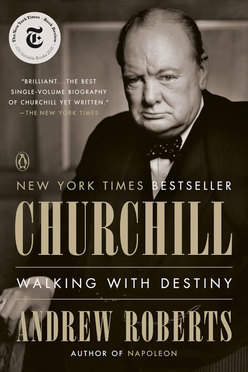Churchill
Walking with Destiny

After finishing The Rise of Theodore Roosevelt, and with a trip to London looming, I gave this well-reviewed biography of Winston Churchill a listen. It did not disappoint.
Churchill and Theodore Roosevelt shared many qualities. Both were well-regarded authors before finding their political destiny. Both possessed amazing powers of recall. Both maintained unshakable faith in their convictions in the face of overwhelming opposition. And both cut their military teeth in Cuba, albeit on opposite sides. Churchill fought for Spain in 1895, while Roosevelt and his “Rough Riders” backed the revolutionaries three years later.
But for all their similarities, Churchill was an aristocrat, and one couldn’t imagine him roughing it in the American Badlands. That said, he never shied away from personal danger. During the London air raids, he would stand atop the Parliament Annexe roof to witness the bombings first-hand. This despite protestations from his wife and even the King.
Churchill merely said, ‘When my time is due, it will come.’ He used to quote Raymond Poincaré, the French President during the Great War: ‘I take refuge beneath the impenetrable arch of probability.’
Churchill also proved more pragmatic than Roosevelt. Though he abhorred communism, he allied Britain with Stalin in World War II—as he hated Nazism even more. But calling Churchill flexible is relative. To his peers, he was stubborn and unbending. They should have seen Theodore Roosevelt.
A lifetime history student, Churchill always considered how future historians would view his decisions. This perspective not only shored his resolve in the face of immense pressure, it lead him to spare Rome from bombing during the war.
‘We must be careful not to bomb the Pope,’ he said to Sir Richard Peirse, the new Commander-in-Chief of Bomber Command; ‘he has a lot of influential friends!’
While Theodore Roosevelt and Churchill didn’t impress one-another at their lone meeting, Churchill would form a strong bond with Theodore’s cousin, Franklin. Churchill made the then-dangerous journey to visit President Roosevelt many times during the war, and the two became close.
Patrick Kinna, Churchill’s stenographer, witnessed a ‘naked and unashamed’ Churchill joking to Roosevelt, as he had his towel passed to him after a bath, ‘The Prime Minister of Great Britain has nothing to conceal from the President of the United States.’
Churchill’s story plays out like narrative fiction. From an early age, he believed his destiny lay in assuming the role of Britain’s savior in her darkest hour. This prescient intuition, combined with his repeated brushes with death, and how circumstances always aligned to shield him from difficult political situations, gives credence to the notion of fate.
But more than the engaging narrative, Churchill’s wit proves endearing.
At lunch … Churchill firmly rejected the first course of macaroni and cheese, saying, ‘The main position is Irish stew and we should not be weakened by attacking these barbed wire entanglements.’
A trait on display even on his 75th birthday:
When the photographer expressed his hope that he would also shoot his hundredth birthday party, ‘I don’t see why not, young man,’ Churchill replied. ‘You look reasonably fit and healthy.’
Or my favorite:
On one occasion he offered a whisky and soda to a Mormon, who replied, ‘May I have water, Sir Winston? Lions drink it.’ ‘Asses drink it too,’ came the reply. Another Mormon present said, ‘Strong drink rageth and stingeth like a serpent.’ ‘I have long been looking for a drink like that,’ Churchill retorted.
Roberts’s well-researched biography more than painted a vivid portrait. It reframed my view of Britain in World War II. I’d long subscribed to a reductive view of America bailing out the Brits, but I now view Britain more akin to the fabled 300 Spartans.
Churchill knew if France and England fell and Germany gained control of their fleets, America would be powerless against the joint fleet’s coastal attacks. Thus, England fought for time. Time necessary for the US to enter the war. Such an unpopular course of action, yet Churchill rallied a nation in support, steeling their resolve to fight on to the end.
Churchill was not a leader for all seasons. He made mistakes and held controversial views. But in the world’s darkest hour, he proved the leader it needed. And he did it with wit and charm.
Reading History
- 2022Jun14TueAudible (Read by Stephen Thorne)
Listened to over 25 Days
- 21 May 20225%
- 22 May 202215%
- 25 May 202223%
- 27 May 202233%
- 4 Jun 202268%
- 5 Jun 202278%
- 14 Jun 2022Finished